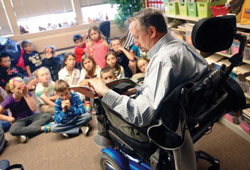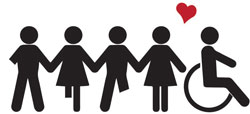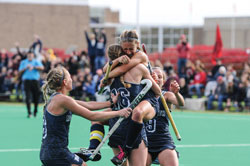“That’s so retarded.”
Every time I hear the word ‘retarded,’ I cringe; what do people really know about the use of the word and why is it used as an insult so frequently?
Growing up with a mother who worked with special needs high school students and growing up with a cousin that had severe cerebral palsy, I knew that the use of the word ‘retarded’ was completely inappropriate.
However, the word is still spewed from mouths of those who just don’t understand the connotation of it or why it is so inappropriate.
For many, disability isn’t something that is prevalent in everyday life. Furthermore, many people didn’t grow up with a stark exposure to disability and therefore, don’t know the proper way to act around those who have disabilities.
The exposure to disability at a young age, whether it is mental or physical, affects children positively because they see people with disability as equal to themselves. To them, there is no disability at all, just another possible friend.
Skip Carey, Director of Disability Services, stated, “Such exposure [at a young age] allows for an opportunity to ‘see ability, not disability’ in an atmosphere of understanding and acceptance.”
If one grows up with an understanding of disability, it makes it easier to have a more open mind to acceptance for those who are different than us.
“Living and working with people with disabilities promotes a sense of inclusion rather than isolation, and helps to level the playing field when it comes to equal access to opportunities that should be available to everyone – including people with disabilities,” Carey continued.
Many people gawk at those with disabilities—not necessarily in a negative view, but in confusion. They don’t know how to treat them or how to speak to them, when, in reality, they should be treated with the same courtesy and in the same way as you would treat anyone else.
Nowadays, it seems that working with disability is more integrated in the classroom. Carey commented, “Classrooms have become more inclusive, and students with disabilities are being educated in mainstream settings. That has resulted in early exposure and opportunities for children of all ages and abilities to interact with each other, both in and out of the classroom.”
Brittany Cote, a junior English student, said, “I personally have noticed that at Monmouth University, every professor I’ve had always lets students know that if they have a disability they can always have accommodations made for them. It’s great to know that Monmouth is taking that step to help every student here succeed and not just a select few.”
Fortunately, this mainstreaming that Carey mentioned is being implemented more and more in public education and because of it, children engage in more contact with peers who have disabilities.
While growing up in an environment that contains a person with a disability or with a parent/relative that works with those who have disabilities makes it easier for children to grow a quicker understanding of the concept, it does not mean that growing up around it is a necessity in order to be respectful and cognizant of disability.
Carey stated, “If the environment in which children are raised promotes understanding, acceptance and respect for diversity of all types, then they will learn at a young age how to treat others with respect and interact appropriately with them, no matter what the difference(s) may be.”
Our upbringings and socialization have a lot to do with how we view others, but ultimately, we control our own outlooks and choose our own environments. Our campus environment is a choice, and this environment of choice promotes equality and understanding. Students are not judged if they visit Disability Services, nor are they judged if they visit Psychological Counseling.
 Katherine Rizman, a psychological counselor of Counseling & Psychological Services, stated, “As humans, we often react to things that are new to us in different ways. These reactions are often responses to our own anxieties due to something being unfamiliar or new. Some people may react to something new with fear or judgment, while others may react with acceptance and kindness. However, a greater knowledge and familiarity of something often positively coincides with a better sense of understanding and empathy for others.”
Katherine Rizman, a psychological counselor of Counseling & Psychological Services, stated, “As humans, we often react to things that are new to us in different ways. These reactions are often responses to our own anxieties due to something being unfamiliar or new. Some people may react to something new with fear or judgment, while others may react with acceptance and kindness. However, a greater knowledge and familiarity of something often positively coincides with a better sense of understanding and empathy for others.”
All in all, the way we interact to those with disabilities is dependent upon ourselves. Yes, socialization and exposure may help with things like acceptance and understanding, but it really depends on us.
As Carey said previously, we must learn to “see ability, not disability”—we are all special in our own unique ways. Whenever we decide to accept that, whether it is during childhood or even now, it is never too late to switch up our outlooks and learn more about those with disabilities to gain a better understanding of how they really aren’t different than you and I.lish student, said, “I personally have noticed that at Monmouth University, every professor I’ve had always lets students know that if they have a disability they can always have accommodations made for them. It’s great to know that Monmouth is taking that step to help every student here succeed and not just a select few.”
Fortunately, this mainstreaming that Carey mentioned is being implemented more and more in public education and because of it, children engage in more contact with peers that have disabilities.
While growing up in an environment that contains a person with a disability or with a parent/relative that works with those who have disabilities makes it easier for children to grow a quicker understanding of the concept, it does not mean that growing up around it is a necessity in order to be respectful and cognizant of disability.
Carey stated, “If the environment in which children are raised promotes understanding, acceptance and respect for diversity of all types, then they will learn at a young age how to treat others with respect and interact appropriately with them, no matter what the difference(s) may be.”
Our upbringings and socialization have a lot to do with how we view others, but ultimately, we control our own outlooks and choose our own environments. Our campus environment is a choice, and this environment of choice promotes equality and understanding. Students are not judged if they visit Disability Services, nor are they judged if they visit Psychological Counseling.
Katherine Rizman, a psychological counselor of Counseling & Psychological Services, stated, “As humans, we often react to things that are new to us in different ways. These reactions are often responses to our own anxieties due to something being unfamiliar or new. Some people may react to something new with fear or judgment, while others may react with acceptance and kindness. However, a greater knowledge and familiarity of something often positively coincides with a better sense of understanding and empathy for others.”
All in all, the way we interact to those with disabilities is dependent upon ourselves. Yes, socialization and exposure may help with things like acceptance and understanding, but it really depends on us.
As Carey said previously, we must learn to “see ability, not disability”—we are all special in our own unique ways. Whenever we decide to accept that, whether it is during childhood or even now, it is never too late to switch up our outlooks and learn more about those with disabilities to gain a better understanding of how they really aren’t different than you and I.
IMAGE TAKEN from billingsgazette.com



